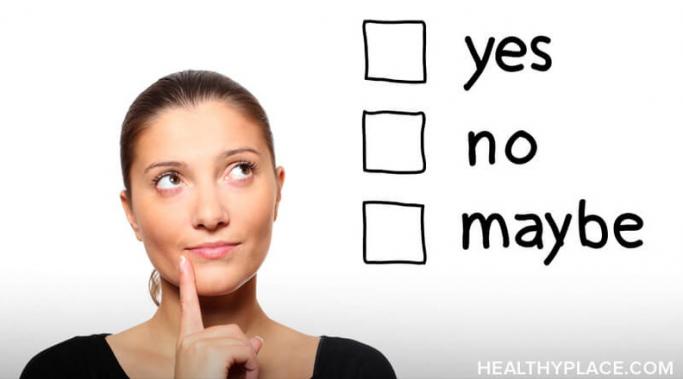Self-esteem is a funny thing. I think we’re all born with it but somewhere along the way it gets damaged for many of us. Self-esteem is simply: “a realistic respect for or favorable impression of oneself; self-respect.” And yet many of us feel pretty much the opposite. We feel an unreasonable disrespect or unfavorable impression of ourselves.
And mental illness may be one reason why.
Being Crazy
Recently a commenter talked about how she felt taken advantage of by a loved one who had schizoaffective disorder. This particular individual seemed to take a lot from his family and gave nothing in return. He refused to shower, help out around the house, pay for anything and would eat out at restaurants with no money and then insist his family come down to the restaurant and pay for him.
The person with schizoaffective disorder was being medically treated and the loved one felt that he was just manipulating the people around him.
Now, I can’t say what the motivation was in this scenario, but certainly, this commenter is not the only one to have found herself in that situation. So the question is, is mental illness an excuse for bad behaviour?
As I wrote, some people believe that if you don't have a mental illness, you can't understand someone with a mental illness. I'm not sure this is true.
I have been writing about mental illness for almost a decade now and part of the reason was to try and help people understand bipolar disorder and other mental illnesses. And I have succeeded in some regards. I get emails from people quite frequently that tell me how much more they understand about the disease now that they have read my writings. I am tremendously gratified by this.
But, of course, I reach a tiny percentage of people and the issue of mental illness stigma still affects us all. And some people, no matter how hard we try to explain ourselves to them, never seem to understand mental illness.
Which begs the question: can a person without a mental illness ever really understand what we’re going through?
For some reason people like to come on here and tell me (and sometimes others) that I’m not bipolar. They feel, for whatever reason, that my writing is not that of a person with bipolar and somehow it indicates that I’m not bipolar. I’m not expressing the right emotions. I’m not writing whatever it is that a “real” bipolar person would be writing.
And this happens in real life too. People somehow feel qualified to determine a person’s mental status simply by the way a person with bipolar acts in front of them.
Well, for the record, I would like to say from me, and all the other mentally ill people in the world: bite me (or, you know, us).
Bipolar is a disease that takes over your brain – well, parts of your brain anyway – and these affected parts of your brain change your psychology right along with them. So once when you felt “normal” or let’s say, average, you now feel utterly destroyed. Your emotions are altered thanks to the attack on your brain.
And what’s worse about this is that bipolar or depression fundamentally changes who you think you are at that moment. If you used to be a fun-loving, happy-go-lucky sort, in a depression, nothing could be farther from the truth. When manic, all your thoughtful, careful ways become things of the past. You can barely identify with the person you were pre-mood.
And perhaps even worse than all that is that some part of you sees this dissonance. You know that who you are at that moment isn’t who you really are. It’s like someone else, a crazy person, moved right into your head and body and coopted your life. Bipolar snatched your body and brain.
Natasha Tracy is not, in fact, my real name. It’s a nom de plume. Writers have a long history of writing under pen names for a whole variety of reasons but one of them has always been judgement. People will judge you, as a person, by what you write. Write erotica, for example, and get yourself a reputation as a slut.
And as a mental health writer, I face similar stigma. True, people aren’t likely to make inferences about my sexual nature (although it has happened) but they will make judgements about me as a person and certainly as an employee.
Because no matter how much I write about stigma and no matter how open people appear to be, a person with a mental illness is simply always assumed to be unequal to someone without a mental illness. Their point of view is always considered to be tainted by their illness. Their thoughts are never considered to be their own.
There is a persistent myth that having bipolar disorder means you have a “broken identity,” or even, “split personality.” I would imagine the term “manic depression” (an older term for bipolar disorder) conjures up these images for some people. But I’m here to tell you, my identity is just fine as is my personality.
Today I was made aware of a site that went up specifically to make fun of, and show hatred towards, those with bipolar disorder. Specifically, the site is aimed at me and all those who use psychiatric services in the treatment of mental illness. Whoever wrote the site feels it's okay to take advantage of people with an illness, people who are in pain.
Well, it's not OK. We're not a joke. We are people. Real, flesh and blood people. And we do not accept your hatred. I do not accept your hatred.
Last night I was feeding my cats and thinking suicidal thoughts - I like to call that a Wednesday night. And I was thinking to myself that no one (save others in my position) understands what that is like - to go from some sort of normal person in the daytime to a sobbing, suicidal headcase at night. I thought about the fact that I have spent eight years talking about this very disease, this very state, this very problem, and yet still, people don't get it. No matter how many words I use, no matter how I phrase it, people simply do not understand.
So what do we do with the lack of understanding by others?


![MP900321083[1]](/sites/default/files/styles/blog_listing/public/uploads/2012/06/MP9003210831.jpg?itok=qIqD0HL6)




